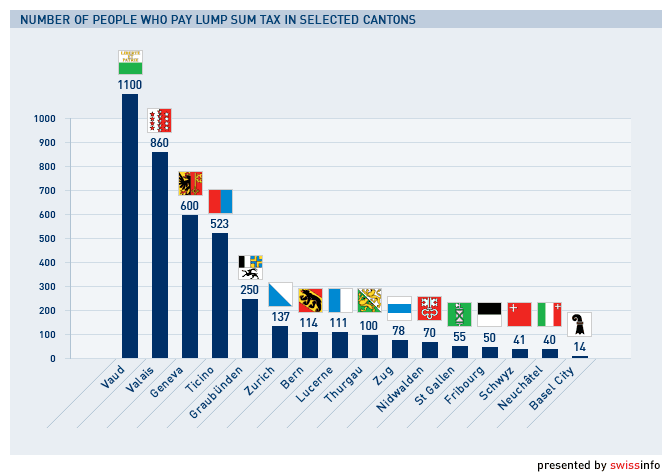Zurich’s rich foreigners face end to tax perks

Controversial tax breaks for foreigners, particularly the lump sum tax, regularly make the headlines in Switzerland and abroad.
Voters in canton Zurich decide this Sunday on a proposal by the political left to scrap the flat tax rate for wealthy foreigners.
Recent attempts on a nationwide level to do away with the special fiscal treatment have failed. But a proposal pending in parliament could receive a boost if the Zurich ballot is passed.
Opponents of the lump sum system argue it is unjust to apply different legal standards, encourage tax evasion and contribute to raising property prices in affluent regions.
They point out that wealthy Swiss citizens are not eligible for the same arrangement as they are taxed according to their income and wealth. Rich foreigners benefit from a flat rate, which allows savings of up to 90 per cent in comparison.
Beneficiaries need to have a residence permit. They must not have a regular professional activity and should not have worked in the country for at least ten years, according to the regulations.
But Ulrich Thielemann, a business ethicist at St Gallen University, says these rules are being flouted.
“Many tax nomads do not really live in Switzerland even though they are registered as residents. Some continue to have huge incomes in other countries,” he said.
His allegations are backed up by official figures. Two out of three people who pay the flat tax are younger than 65 and still doing business on a day-to-day basis.
Originally the system was introduced back in 1930 for a very small group of people. It attracted rich artists, including comedian and film director Charlie Chaplin, who settled on Lake Geneva.
Consumers
Supporters of the preferential fiscal rate say it is a magnet for rich people who will help boost domestic consumption.
“Rich foreigners would move to other Swiss regions or go to live in other countries if Zurich were to do away with the lump sum tax,” says Filippo Leutenegger, a parliamentarian for the centre-right Radical Party.
He adds that abolishing the tax would mean foregoing fiscal revenue. “Other taxpayers would have to make up for the shortage.”
Leutenegger maintains that the debate over a lump sum tax has got little to do with justice or injustice. “It is about envy and jealousy.”
A majority of political parties have come out in favour of keeping the special fiscal arrangement, which is challenged by the centre-left Social Democrats, the Greens and other leftwing groups.
There are 137 people who are granted lump sum taxation in canton Zurich – the most populous Swiss region which includes the city of Zurich.
Experts point out that the number of people who pay a lump sum has increased sharply in several regions over the past few years as a result of a bilateral treaty with the European Union easing access to each other’s labour markets.

More
Taxation
Tax row
Wealthy foreigners regularly make the headlines when they move to Switzerland. In 2006 the French singer and actor Johnny Hallyday became the latest international celebrity to join the ranks of rock stars Tina Turner and Phil Collins, and Germany’s ex-Formula One driver, Michael Schuhmacher.
By taking residence in the Swiss alpine resort of Gstaad Hallyday reportedly saved up to €4 million (SFr5.9 million) in taxes annually. But his move caused outrage in Switzerland and in France.
Tax breaks for foreign residents in Switzerland and holding companies from EU countries have strained relations with Brussels over the past few years.
The EU is seeking ways to stop firms moving their headquarters to non-EU member Switzerland.
Germany and France have called for Switzerland to be put on a blacklist of non-transparent tax havens.
Last October, the German finance minister, Peer Steinbrück, criticised the Swiss government for inadequate cooperation on tax matters.
He said the Swiss system permitted German taxpayers to commit tax fraud. However, Swiss law does not recognise tax evasion as a criminal offence.
Germany says the Swiss authorities should increase efforts to crack down on foreign nationals who deposit funds in Swiss banks to avoid paying taxes back home.
swissinfo, Urs Geiser and Erwin Dettling
More than 4,100 wealthy foreigners with residency status in Switzerland benefited from special tax treatment, according to 2006 figures by the cantonal authorities.
Most beneficiaries live on Lake Geneva and in the Valais, Graubünden and Ticino regions.
The lump sum tax results in annual revenue of SFr392 million ($336 million) – between 1% and 2% of the total tax proceeds for the federal, cantonal and local authorities.
More than half of Switzerland’s 26 cantonal authorities offer a lump sum to rich foreigners. A number of cantons have 0-5 residents who benefit from the preferential rate, according to 2005 figures by the federal authorities.
A proposal to scrap such fiscal breaks is pending in parliament. Two previous attempts by the centre-left failed.
The tax is not based on income and wealth, as in the case of ordinary Swiss residents.
Instead it is calculated on a minimum amount – generally the equivalent of five times the annual rent or the rental value of the house the taxpayer lives in.
Such a fiscal assessment is aimed at allowing taxpayers to maintain their previous lifestyle when they move to Switzerland.
Only foreigners with a residence permit are eligible for lump sum taxation. They must not have a day-to-day professional activity or have worked in the country for at least ten years.
There are huge differences in the lump sum tax levied by the country’s 26 cantons and the more than 2,600 local authorities.


In compliance with the JTI standards
More: SWI swissinfo.ch certified by the Journalism Trust Initiative












You can find an overview of ongoing debates with our journalists here . Please join us!
If you want to start a conversation about a topic raised in this article or want to report factual errors, email us at english@swissinfo.ch.